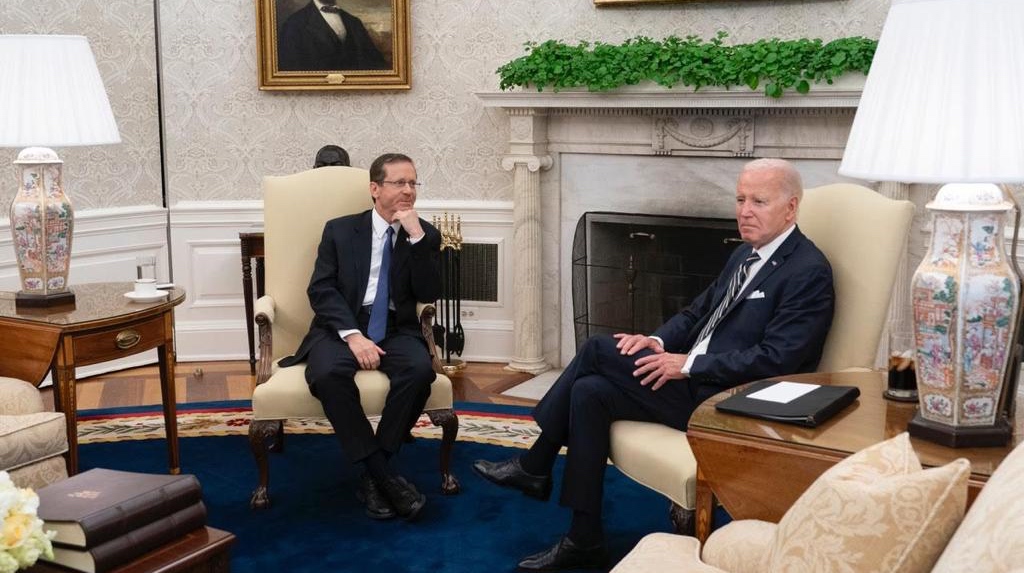Herzog: Israel should take Biden’s concerns about judicial overhaul into consideration
Herzog’s advice was unusual in a foreign leader insisting that the United States had a role to play in a matter of internal debate

Israeli President Isaac Herzog meets with President Joe Biden at the White House, July 18, 2023. (Haim Zach, Israel Government Press Office)
WASHINGTON (JTA) — President Joe Biden’s concerns about Prime Minister Benjamin Netanyahu’s planned overhaul of Israel’s courts system should be taken into account by the Israeli parties seeking a compromise, Israeli President Isaac Herzog said after meeting Biden.
Herzog’s advice, effectively aimed at Netanyahu and appearing only in his comments in Hebrew to Israeli media after his White House meeting on Tuesday, was unusual in a foreign leader insisting that the United States had a role to play in a matter of internal debate.
“It’s not like the relationship between the United States and countries that are very important to it, this is a relationship with deep family elements, with mutual concern about what happens in the United States and of course in Israel,” Herzog said.
The appeal comes as U.S.-Israel tensions increase, with members of Netanyahu’s cabinet openly accusing Biden administration officials of colluding with the opposition.
Herzog’s conversation with Biden “covered regional issues, the Iranian threat, what’s happening with the Hezbollah in Lebanon, but also what is happening in Israel and we have to understand and respect this, that when the president of the greatest power on earth asks questions and interests himself, as he did in his conversation with the prime minister yesterday, it’s not just for fun, not to gossip, to bother us, it comes from deep concern from many of our friends,” the Israeli president said.
“It’s another consideration for us as a people in this moment, to come to understandings, to agreements, to dialogue, to drafts [of a legislative deal], because at the end of the day, Israel is very important to the world, it’s very important to the region, it’s very important t to the United States, and that must also be a consideration to our brothers and sisters in Israel,” he said.
Herzog, who is scheduled to speak to Congress on Wednesday to mark 75 years of the U.S.-Israel relationship, is in a delicate position. He has decried Netanyahu’s original proposals as having the potential to bring Israel to the brink of civil war, and has offered his services to broker a compromise. Talks are currently at an impasse.
Yet his role is seen as above politics and he is expected to represent all of Israel including the government of the day. Herzog was previously a leader of the Labor Party and ran against Netanyahu in 2015.
Massive protests against the planned overhaul, which would sap the courts of much of their independence, have rocked Israel for months. The protesters see the courts as a bulwark protecting vulnerable populations, including women, Arabs, the non-Orthodox and the LGBTQ community, and say the legislation to blunt their power would jeopardize Israeli democracy.
Biden, unusually, invited Herzog to the White House before inviting Netanyahu, and he has made it clear that his delay in inviting Netanyahu was because he was unhappy with the direction of Netanyahu’s current government. In a conversation this week, Biden told Netanyahu that he hoped to see him in the United States soon.
In addition to the proposed courts reforms, Biden is also unhappy with Israel’s government because of its accelerated settlement in the West Bank, and because of the extremists that Netanyahu has joined with in his coalition. Israel’s government is its most right-wing in history.
The English-language commentary by Biden and Herzog barely addressed tensions between the two countries.
“I was pleased to hear about your conversation with Prime Minister Netanyahu, which focused on our ironclad military and security cooperation,” Herzog said as he and Biden meant in the Oval Office. “Because there are some enemies of ours that sometimes mistake the fact that we may have some differences as impacting our unbreakable bond. I truly believe that if they would know how much our cooperation has grown in recent years and achieved new heights, they would not think that way.”
This article originally appeared on JTA.org.
A message from our Publisher & CEO Rachel Fishman Feddersen

I hope you appreciated this article. Before you go, I’d like to ask you to please support the Forward’s award-winning, nonprofit journalism so that we can be prepared for whatever news 2025 brings.
At a time when other newsrooms are closing or cutting back, the Forward has removed its paywall and invested additional resources to report on the ground from Israel and around the U.S. on the impact of the war, rising antisemitism and polarized discourse.
Readers like you make it all possible. Support our work by becoming a Forward Member and connect with our journalism and your community.
— Rachel Fishman Feddersen, Publisher and CEO


























